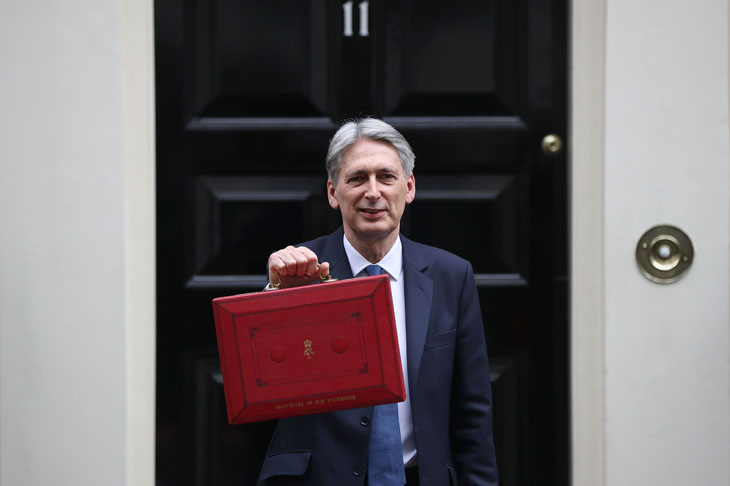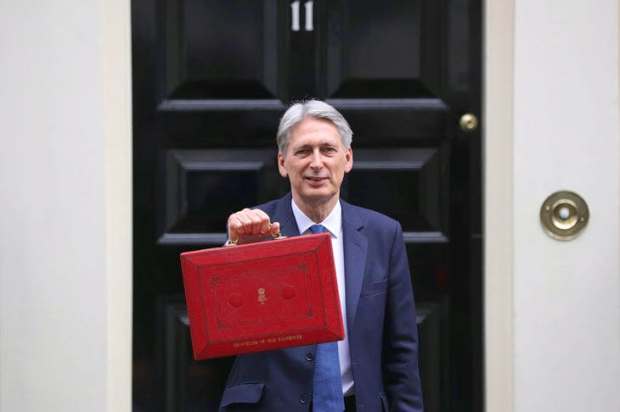Chancellors often enjoy a Budget for the chance it gives them to show off. They enjoy wrong-footing their opponents with a dramatic and unexpected announcement right at the end of their speech — the much-anticipated rabbit pulled from the hat.
But Philip Hammond is not a political showman. He must be the only Chancellor in living memory to have played down his first Budget, telling colleagues with big ideas to come back to him this autumn.
This lack of showmanship should not be mistaken for an absence of serious intent. He is unique among recent chancellors for two reasons: he has no ambition to move one door along to No. 10 Downing Street, and he can be confident of a long stint in the job. Indeed, he is pretty much unsackable — and his opening joke about getting fired suggested that he thinks as much. As Theresa May attempts to navigate her way through Brexit, her Chancellor plays an important role in reassuring the City, the markets and Tory Remainers that all will be done sensibly. If he walked out, saying it was impossible to do Brexit well, the pound would have more than a bad day on the foreign exchange market.
Gordon Brown’s tenure at the Treasury was defined by his desire to move next door. Every Budget was an attempt to show Labour MPs that he could do the top job better than the then incumbent. The key to understanding his speeches was to look for the sleight of hand that let him magic that rabbit from the hat. The apogee of this came in his final Budget. I have never heard the House of Commons cheer louder than when Brown announced he was cutting the basic rate of tax by 2p. But this decision contained the seeds of his destruction, paid for as it was by the abolition of the 10p rate of tax.
George Osborne’s aim was slightly different. He was constantly trying to reshape the economy in ways that would tilt Britain to the right, making it an easier place for Conservatives to win elections. His were the Budgets of a political strategist who knew which way he wanted to move. Every-thing from his decision to introduce pension freedoms to cuts in corporation tax was designed with one overall aim in mind.
Hammond does have a vision for the British economy. But it is a markedly less political one than his predecessor’s. Tellingly, he doesn’t see the rise in self-employment — a phenomenon that will create a new set of workers particularly sensitive to tax rates and therefore keener on a smaller state — as a boon to the Tories but as a threat to the tax base. His increase in National Insurance rates for the self-employed was an economic decision, not a political one. It won’t be popular with many Tory members. But it sounds as if this blow will be softened by state–funded maternity and paternity leave for the self-employed.
Unsurprisingly for someone who studied PPE at university, Hammond’s great interest is in productivity. It doesn’t require a Nobel prize in economics to work out that productivity growth is the biggest weakness of the British economy, and Hammond believes there are two keys to increasing it: infrastructure and skills. Having concentrated on infrastructure in the autumn statement, he turned his attention to skills in this Budget. The question now is whether these reforms will be more successful than previous efforts. T-levels, the new technical qualifications, are not a bad idea. But too often in the past, technical education in Britain has ended up being dumbed down. David Willetts, the former Tory minister, used to say that because of the people Tory ministers encountered they were very aware of threats to the hedge-fund industry, but nowhere near as aware of problems for manufacturers. Much the same goes for technical education.
This Budget was a reminder of how much Brexit dominates our politics, and will continue to do so. Hammond is a fiscal conservative, but without Brexit one doubts that the rest of the government would have accepted so easily the Treasury’s insistence that better-than-expected tax receipts must be set aside for any trouble ahead. He might have chosen to strike a far more upbeat public tone about Brexit in recent months. But the Cabinet knows that he remains privately convinced that uncertainty will take its toll on economic growth at some point.
Inside No. 10, they argue that Brexit and the Conservatives’ economic agenda complement each other — that they are two sides of the same coin. The steps needed to improve productivity are, for instance, benefits in their own right and will be part of getting Britain and its workforce match-fit for Brexit. But in the short term, the key question is whether the economy can stay as resilient throughout the Article 50 process as it has done in recent months.
In the medium term, the issue is whether Britain can take advantage of the opportunities that Brexit offers. After all, leaving the European Union is simply the removal of a constraint rather than a guarantee of success. So the nation has to seize its chance to make this the best place to build a technology company or carry out medical research.
That will require a shift in mindset — it will no longer be enough to be one of the best places in Europe to do these things. Britain will have to accept that it is now competing at a global, not regional, level. Broadband speeds, for instance, should not be measured against France and Germany but South Korea and Japan.
Hammond’s first Budget won’t make waves. It was worthy but not radical. His autumn Budget, which he has always said will be the main event of this year, will need to be a more ambitious affair.
Got something to add? Join the discussion and comment below.
Get 10 issues for just $10
Subscribe to The Spectator Australia today for the next 10 magazine issues, plus full online access, for just $10.
You might disagree with half of it, but you’ll enjoy reading all of it. Try your first month for free, then just $2 a week for the remainder of your first year.















Comments
Don't miss out
Join the conversation with other Spectator Australia readers. Subscribe to leave a comment.
SUBSCRIBEAlready a subscriber? Log in